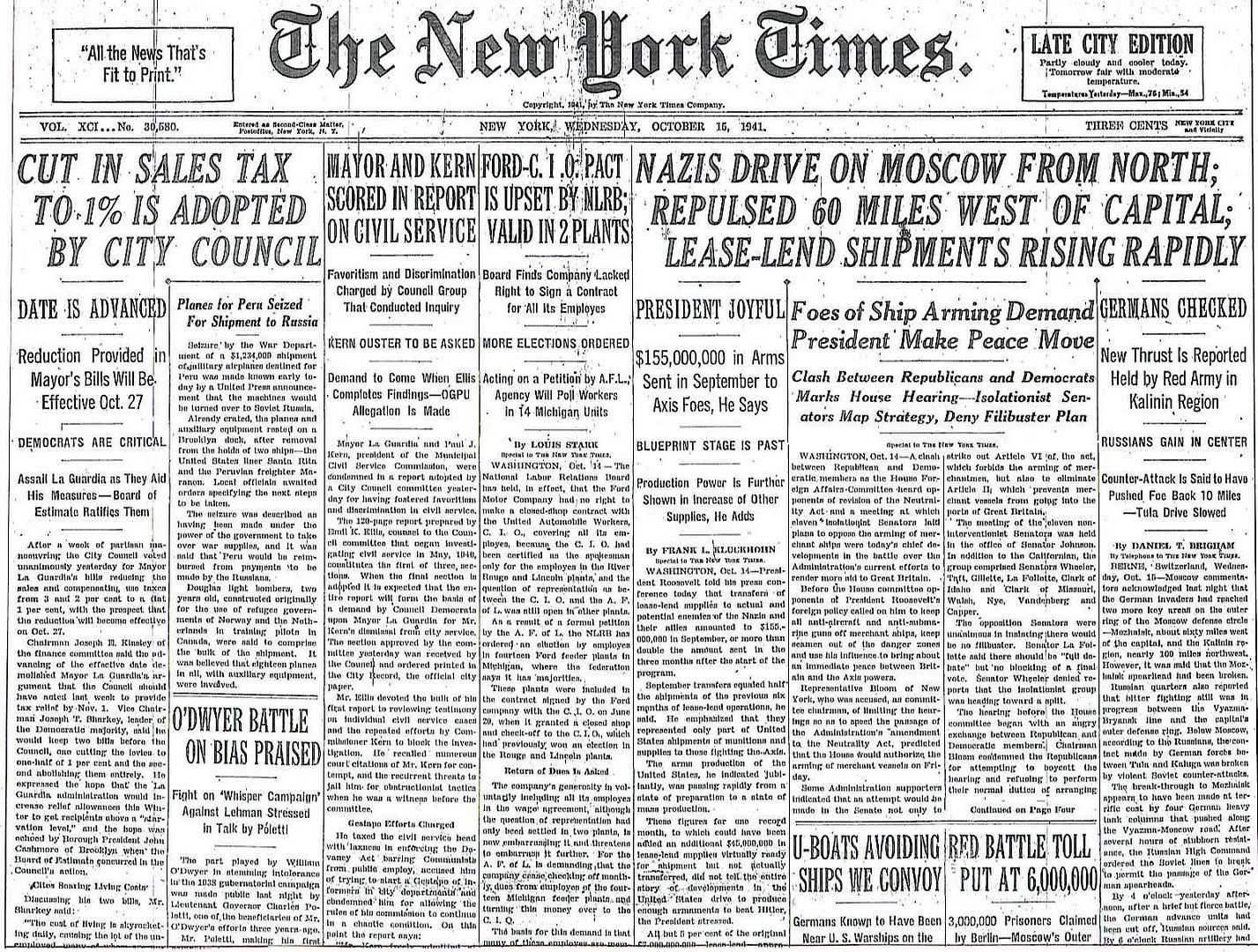
Posted on 10/15/2011 4:29:04 AM PDT by Homer_J_Simpson

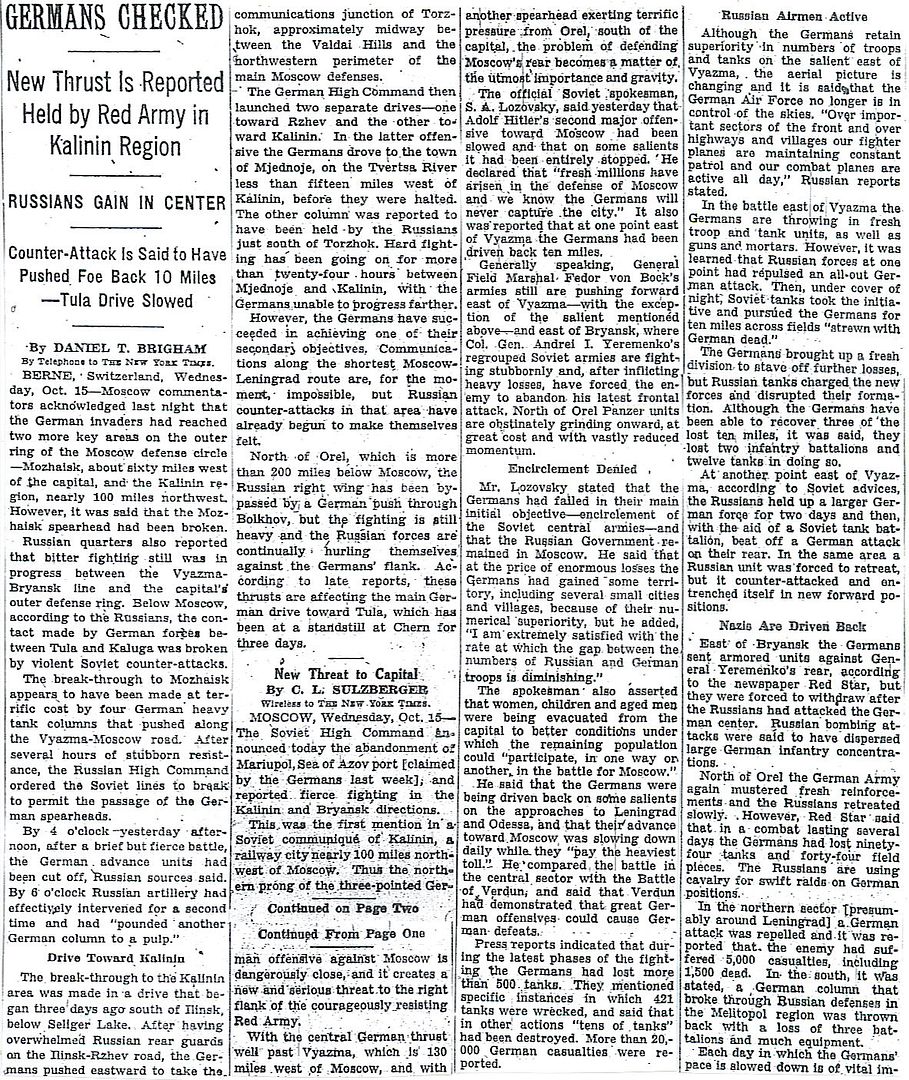
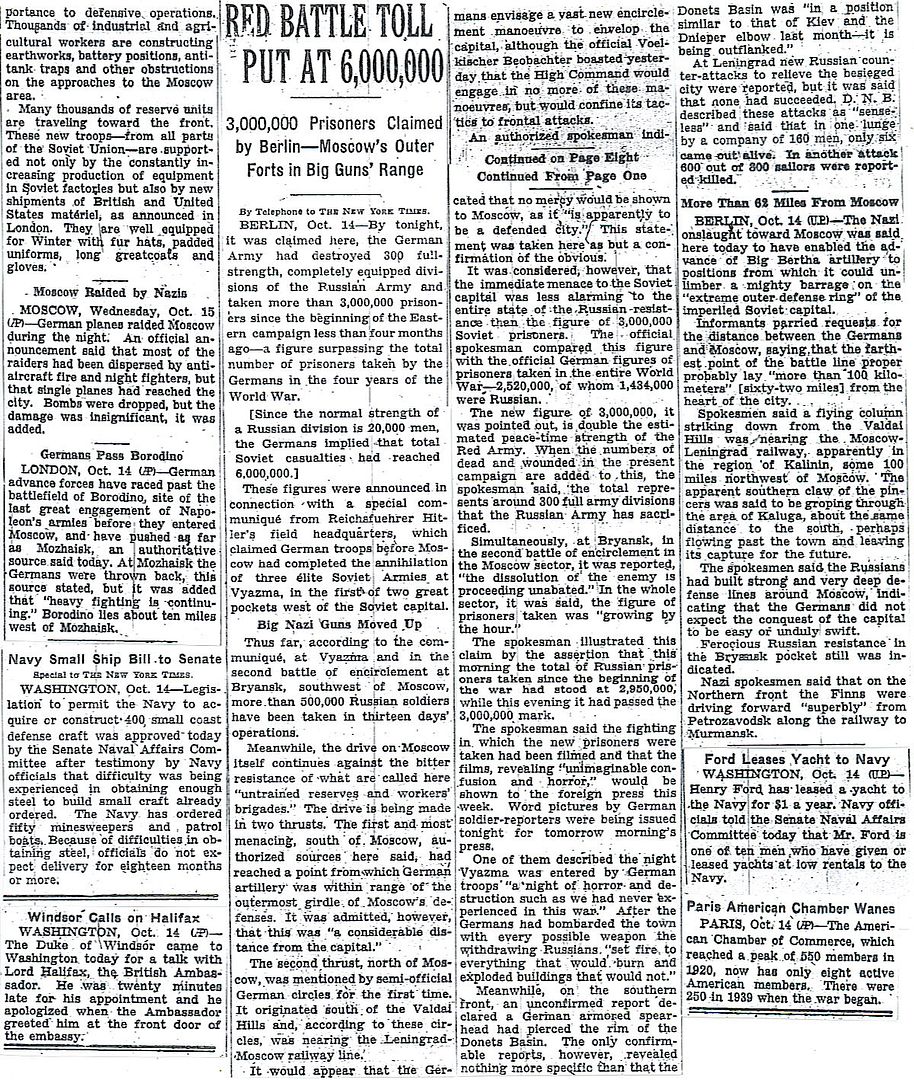
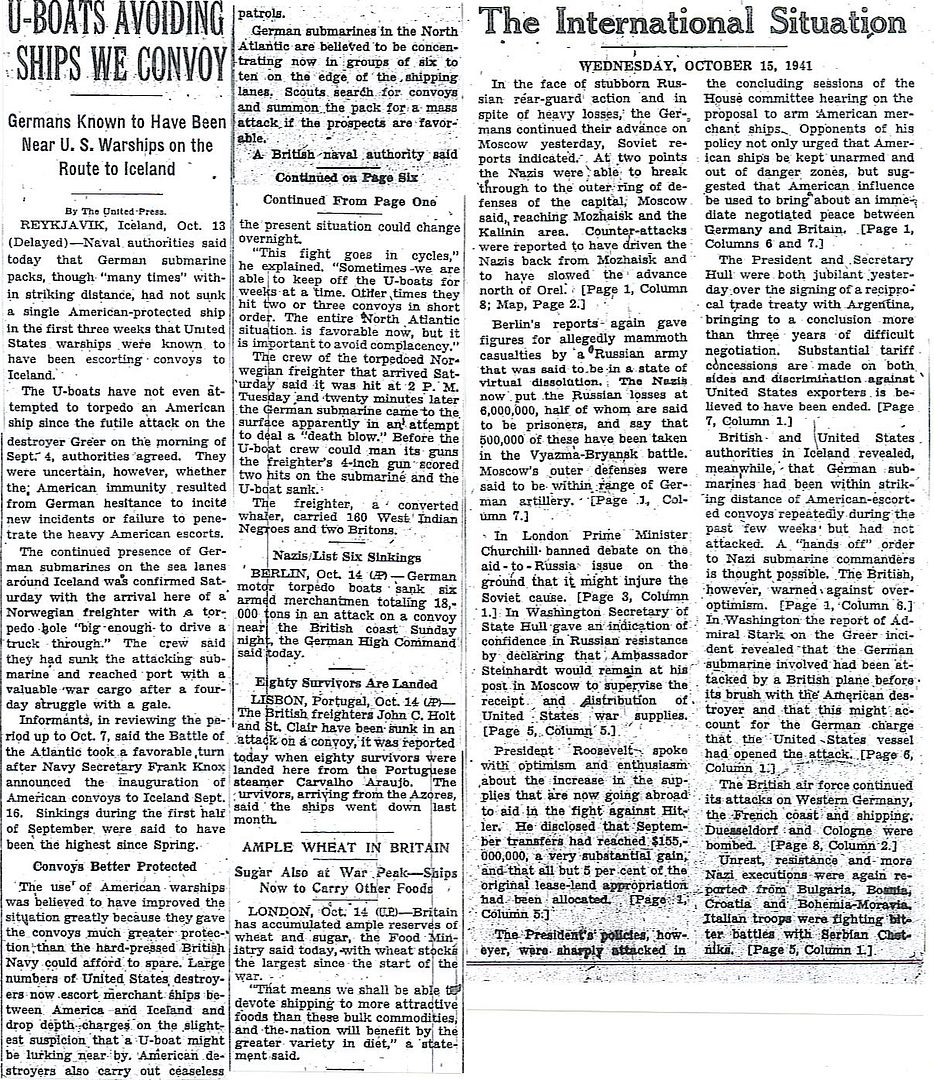
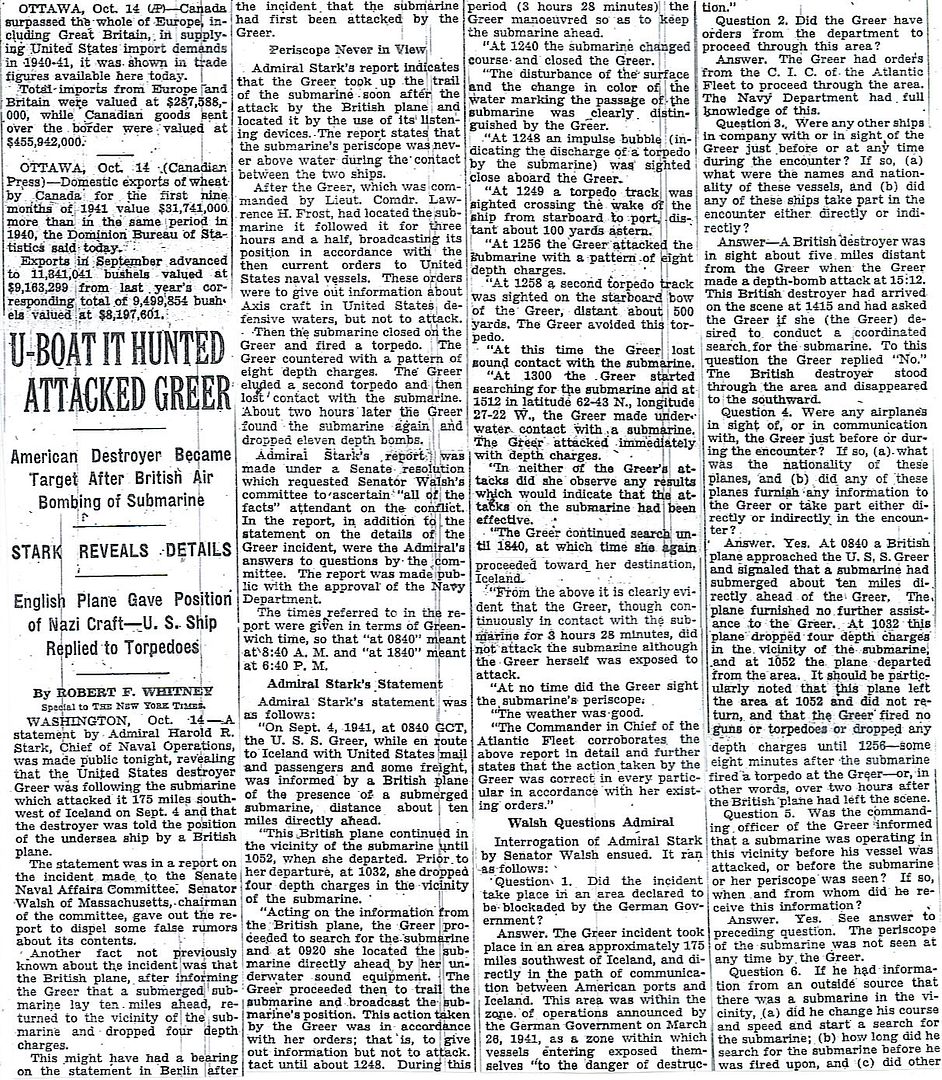
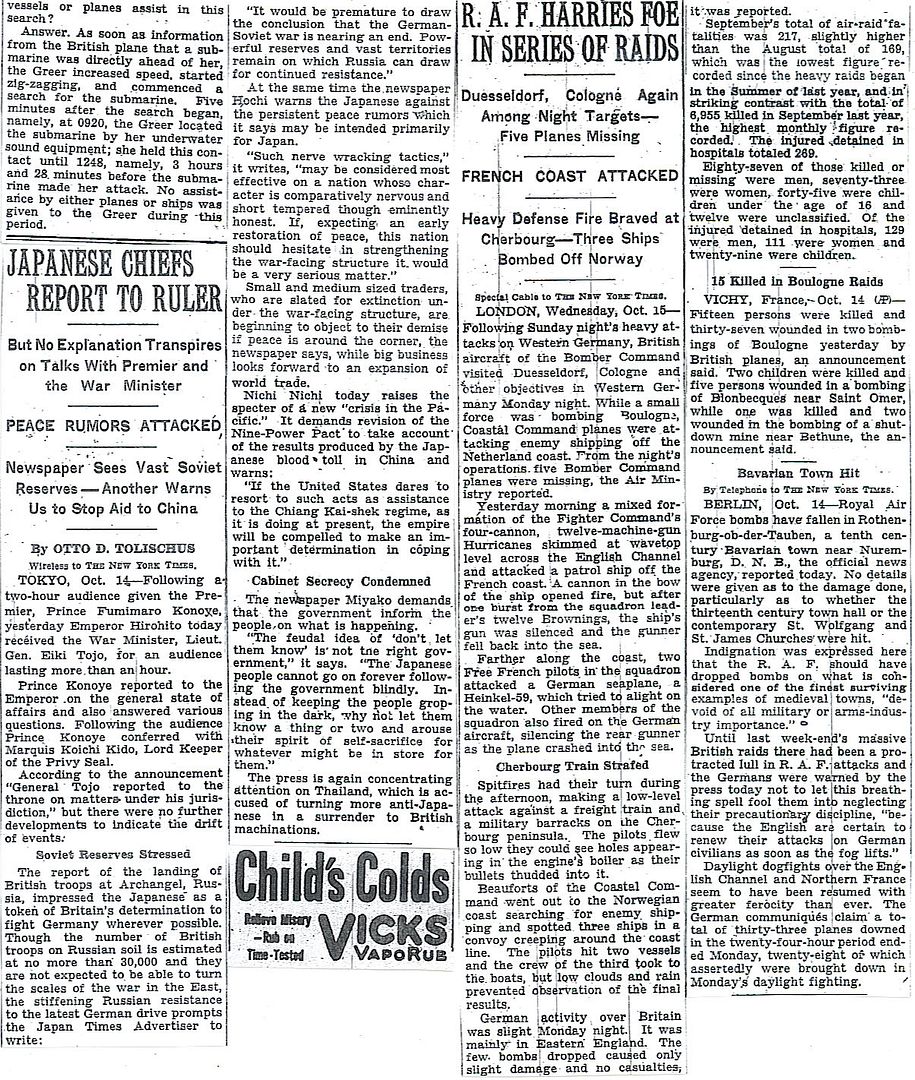
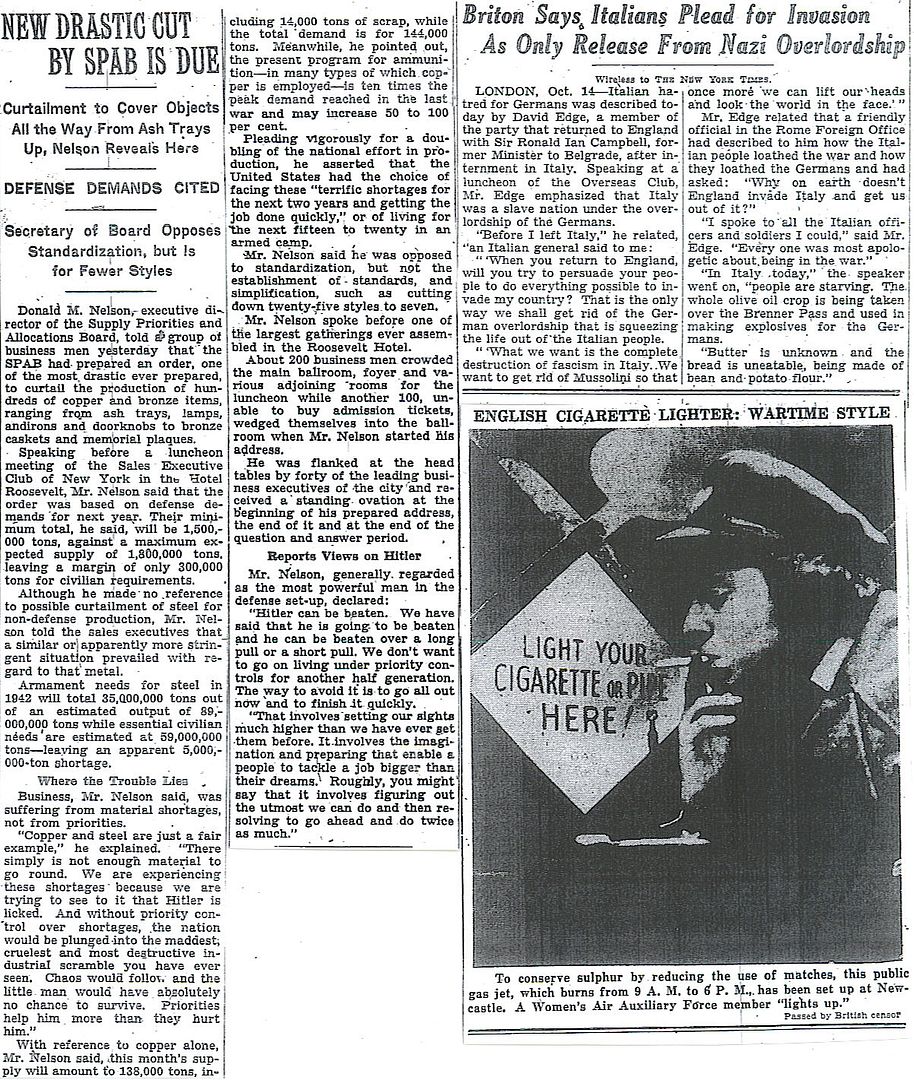
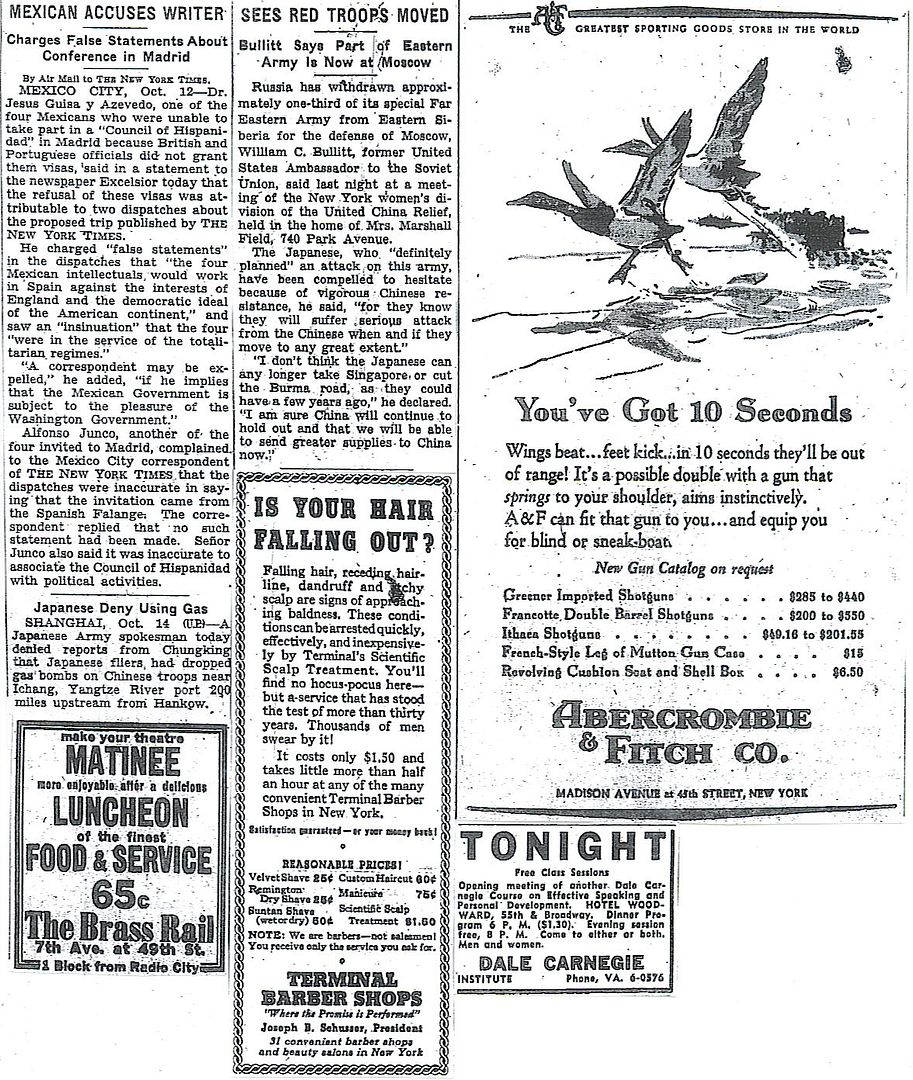
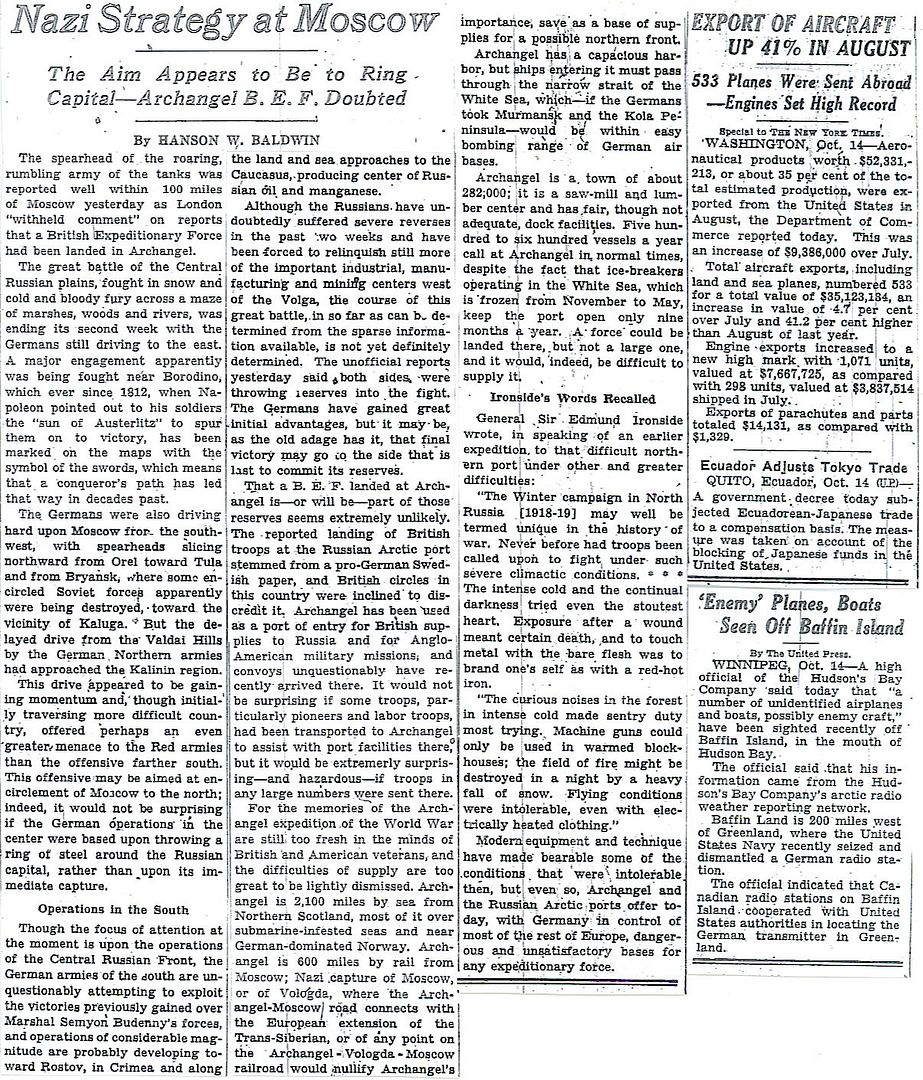
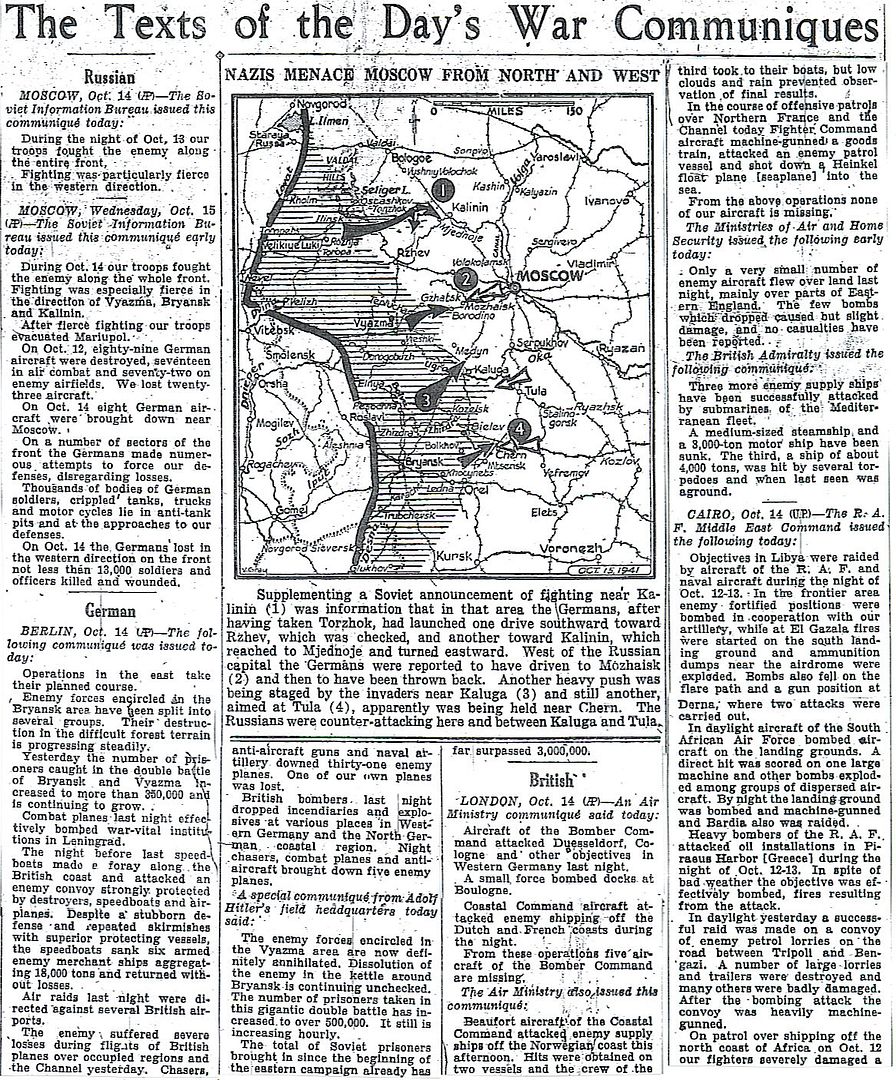
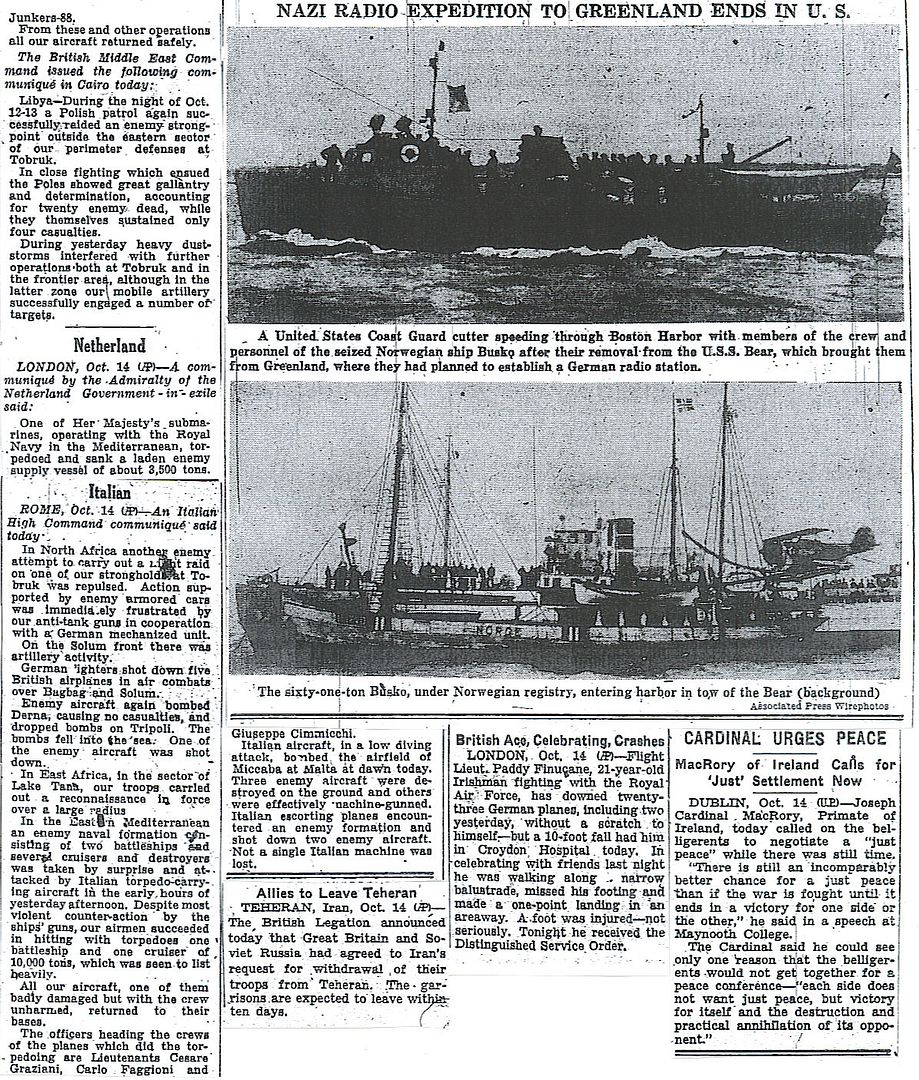
http://www.onwar.com/chrono/1941/oct41/f15oct41.htm
Jew restricted to ghettos
Wednesday, October 15, 1941 www.onwar.com
Entry and exit forbidden — A door into the ghettoIn Occupied Poland... German authorities announce that any Jewish persons found outside of the ghettos will be executed on sight.
On the Eastern Front... The Soviet evacuate Odessa on the Black Sea, a pocket which has held out behind the German lines for several weeks. Approximately 35,000 men from three divisions are taken off to Sevastopol. Two cruisers, four destroyers and many smaller craft are used for the removal.
http://homepage.ntlworld.com/andrew.etherington/month/thismonth/15.htm
October 15th, 1941
UNITED KINGDOM: Destroyer HMS Tyrian laid down. (Dave Shirlaw)
GERMANY:
U-270 and U-921 laid down.
U-335, U-379 and U-599 launched.
U-88 commissioned. (Dave Shirlaw)
POLAND: A German Decree is issued in Warsaw. It confines all Jews to the ghettos. The penalty is automatic execution.
U.S.S.R.: Odessa is evacuated by the Russians after holding out for several weeks.35,000 men are involved. Most units of the Soviet Black Sea Fleet are now based at Sevastopol.
MEDITERRANEAN SEA: The British submarine HMS TORBAY bombards the Libyan port of Apollonia.
JAPAN: Hozomi Ozaki, a Japanese author, journalist and spy for the Soviet Union under Richard Sorge, was arrested for treason. He was a member of a high-level, policy-planning brain trust that advised the Japanese Prime Minister and was in a position to pass on high-level secrets to Soviet spy Sorge. Ozaki was executed along with Sorge in 1944, his letters to his wife and daughter were published after the war and became a best seller, with a Japanese people struggling to come to terms with the defeat and looking for new heroes from their past, untainted by the crimes of the militarists.
CANADA:
Corvette HMCS Louisburg arrived Halifax from builder Quebec City, Province of Quebec.
Patrol vessel HMCS Moolock 84x20ft, Built by Victoria Motor Boat and Repair Works, Ltd, Victoria. Launched, 1-mg, Fisherman’s reserve, west coast, sold 1946 and renamed Western Girl I.
Corvette HMCS Sudbury commissioned.
Tug HMCS Becanoeur ordered from Marine Industries Ltd, Sorel, Province of Quebec.. Ex-Dept of Transport tug, for conversion to gate vessel. Yard#85, Log - jn 231, completed 1942, Post WW.II sold Marine Industries Ltd, commercial, renamed Becanoeur #133954. (Dave Shirlaw)
U.S.A.: The War Department releases a large number of jeeps, ambulances, trucks and sedans for shipment to the Philippine Army, “subject to the availability of shipping.” (Will O’Neil)
ATLANTIC OCEAN: At 0705 hrs U-553 sights convoy SC 48 and attacks an hour later, torpedoing and sinking British motorship MS Silvercedar and Norwegian freighter SS Ila before at 1024 the U-boat is driven off by Canadian destroyer HMCS Columbia [ex-USS Haraden (DD-183)]. U-432, U-502, U-558 and U-568, followed by U-73, U-77, U-101 and U-751 converge on the convoy, and one of these boats, U-568, torpedoes and sinks British steamer SS Empire Heron before being driven off by British corvette HMS Gladiolus. During this next attempt at 1624 hrs the escort HMCS Columbia attacks U-553 with six depth charges, but without result. Two hours later the Canadian escort attacked with a torpedo. More depth charges followed. In the night the boat lost the convoy when it changed course. Consequently, the USN’s Task Unit 4.1.4 (Captain Hewlett Thebaud), comprising 4 U.S. destroyers, is directed to proceed to SC 48’s aid as the west-bound convoy it had been escorting, ON 24, is dispersed. (Jack McKillop)
SS Vancouver Island 9,472 GRT, Canadian Merchantman, 15kts, ex-Weser (German) sunk in the North Atlantic at 53.37N, 025.37W, by U-558, OLtzS Günther Krech, Knights Cross, CO. There were no survivors from her crew of 65, which included 32 passengers and 8 DEMS gunners. 3 RCN DEMS gunners killed. Weser was captured 25 Sep 40 off the coast of Mexico by HMCS Prince Robert. She had been sailing independently when she was sunk. Her relatively high speed of over 15kts, made her a valuable blockade runner for the Germans, and was considered sufficient to rendered her invulnerable to submarine attack.
I’m not what the significance is of the increased mention in these articles of Soviets shifting reserves from the east and of the upcoming Russian winter.
"German authorities in Poland decree that any Jew found outside a designated ghetto will be shot. Further, any non-Jewish Pole who aids a Jew will be executed."
"The victims of Nazi massacres were almost always buried in mass graves, such as this one in Yugoslavia containing the bodies of Jews and Gypsies murdered by the 750th Infantry Regiment in October 1941.
As part of an effort to conceal their horrific crimes, the Nazis would later dig up many of these mass graves so that the bodies could be burned.
This is yet another example of atrocity compounded by stupidity.
To unearth mass graves was a monumental undertaking, as the Nazis had been filling them across Europe for months.
Many graves remained untouched until discovered by Allied troops, and even when remains had been exhumed by Germans, considerable physical evidence remained at overburdened ovens and ineffectual outdoor pyres."
The Soviets were able to send the “Siberian” army which faced the Japanese army in China because they had a guarantee from their spy Sorge that the Japanese would not attack. If the Japanese had attacked the Soviets in the East the war would have been lost for the Soviets. This was probably the most momentus decision in WW2. Hitler’s 2 month delay on the drive for Moscow while Kiev was taken was also just as momentus. Without the Siberian army the Soviets only had the remnants of already shattered armies/divisions to face the Wermacht at it’s pinnacle of strength.
Part Four- On To Moscow
On they marched, the infantrymen of 78th Infantry Division, along a road pockmarked with craters and water-holes, from Vyazma, east towards Moscow.
It was raining. Presently, for a change, snow fell.
Their stomachs were rumbling. Their field kitchens were jammed somewhere behind in the mud. Their uniforms were sodden and stiff with dirt. This was no longer the sweeping advance of the hot summer days.
How long ago was that?
It seemed a lifetime ago. They had marched through the summer and through the autumn. And now they were marching through the mud and slush into the winter.
While the 78th Division was moving along the right-hand side of the highway in a long, unending column, the companies of 87th Infantry Division were trudging along to the left of it. The middle was kept free for traffic in the opposite direction.
South of the motor highway, between Yukhnov and Gzhatsk, the 197th Infantry Division was struggling eastward along another appalling road. On 19th October, a Sunday with rain and snow, its regiments clocked up their 930th mile of foot-slogging.
Nine hundred and thirty miles!
Captain Küppers, the commander of 1st Battalion, 229th Artillery Regiment, was impatient with the rate of progress.
The road he was on was so rutted and deep in mud that his artillery vehicles were hardly able to make any headway at all in the deep morass. With the permission of Lieutenant-Colonel Ruederer, the leader of the column, he turned off along the transversal road from Yukhnov to Gzhatsk, with the intention of reaching the motor highway. There, he thought, progress would be easier and faster. The artillerymen reached the highway. But they had not expected the picture they saw.
Mud-hole after mud-hole, and pitted with deep craters, the highway was jammed tight with vehicles.
There was no hope here for his horse-drawn batteries.
Along the highway sector from Gzhatsk to Mozhaysk alone between 2000 and 3000 vehicles were stuck deep in the mire, immovable witnesses to man’s arrogance and pride.
After what they had seen the artillerymen of 197th Infantry Division hurriedly turned back again. Back into the mud. Their speed, which had averaged 28 miles a day in the summer, had dropped to sometimes less than one and never more than three miles per day.
At night, worn out with fighting, battered, filthy, lice-ridden, hungry, and weary to death, they crowded around the stoves of the miserable peasant shacks in the small villages. The wretched horses outside were pressing against one another, nibbling the ancient mossy straw on the low roofs.
Inside the troops were drying their uniforms. And if any of them asked, " Any idea where we are?" he would get the plain soldier's answer: " Right up the asshole of Europe!"
The following morning they would trudge on again, on and on, in the track of the motorized divisions.
On and on, towards Moscow, where destiny beckoned.
By the second half of October Moscow's first line of defense had been pierced everywhere on a broad front between Kaluga and Kalinin.
The German divisions were advancing against Moscow's second and last line of defense along three main roads —from Maloyaroslavets to Moscow, from Naro-Fominsk to Moscow, and from Mozhaysk to Moscow. This second line of defense, ran, reading from south to north, from the town of Tula to Serpukhov, thence along the Nara via Naro-Fominsk to the Nara Lakes on the motor highway, then along the Moskva valley via Zvenigorod, Istra, the Istra reservoir, and Klin to the "Moscow Sea," south-east of Kalinin.
By the end of October Moscow's doom seemed sealed.
In the north, in the area of what used to be Hoth's Third Panzer Group and was now the Third Panzer Army commanded by General Reinhardt, the Thuringian-Hessian 1st Panzer Division had succeeded in crossing the Volga in an eastward direction at Kalinin. The combat group Heydebrand, with Training Brigade No. 900 attached to it, thrust along the Torzhok road as far as Mednoye and blocked the roads and railway to the north. A few days later, however, the combat units had to be taken back again to the outskirts of Kalinin, following fierce fighting with fresh reinforcements of Siberian armored formations. By violent counter-attacks the Russians were trying to regain this important cornerstone of Moscow's defenses on the Upper Volga. Their efforts were in vain. Parts of 6th Panzer Division, of 14th and 36th Motorized Infantry Divisions, and later also of 129th Infantry Division, jointly succeeded in holding the vital bridgehead. It was consolidated by XLI Panzer Corps, now under the command of General Model.
The main pressure of the German offensive, however, was along both sides of the Moscow motor highway.
Fighting was heaviest there in the area of General Stumme's XL Panzer Corps. Its 10th Panzer Division had taken Shelkovka, an important and strongly fortified road junction, and had advanced across the Moskva river into the area north of Ruza. The task of the Corps was to strike at Moscow from the northwest with the " Reich " SS Infantry Division and 10th Panzer Division. The 10th Panzer Division was determined to be the first in Red Square.
It was halted 49 miles outside Moscow—not by the Russians but by the mud.
General Fischer's division had to be supplied along a nine-mile causeway of timbers placed on the mud. Along both sides of this wooden road the vehicles, guns, and tanks lay motionless, stuck fast. Infantrymen, sappers, Panzerjagers, and motor-cycle troops were entrenched in the villages and forests. The tanks had no fuel left. The guns received only a dozen shells each day. Meanwhile the Russians were launching ceaseless attacks with their T-34s, which remained maneuverable on the soft ground.
The 10th Panzer Division lay bogged down, slowly bleeding to death.
Those who survived remembered and cursed the villages of Prokovskoye and Skirminovo to their dying day.
The men sat in the peasant houses, in despair, praying for the ground to freeze so they could move again. But the frost was slow in coming that year. Meanwhile the division was bleeding to death.
When Major-General Fischer reported his effective strength to the Corps commander, General Stumme exclaimed, horrified, " Good God, this is no more than a reinforced reconnaissance patrol."
Thirty miles south of XL Panzer Corps the 78th Infantry Division had likewise driven a wedge 20 miles deep into the enemy's positions, driving from Ruza along the Zvenigorod— Moscow road, and had thus come up close to the main fortifications of Moscow's second line of defense.
In difficult forest fighting and against strong roadblocks the 195th and 215th Regiments, in particular, mastered superhuman difficulties. They succeeded in gaining the fortified ground west of Lokotnya, within 40 miles of Moscow.
But then the mud took over and brought the attack to a standstill on that sector too. They had to wait for the frost.
Had nature conspired against the German forces?
Would nothing be successful any more?
Oh, yes, some actions were. The 258th Infantry Division and the 3rd Motorized Division were luckier. The 258th succeeded, by means of a daring stroke of Major Lübke's 2nd Battalion, 479th Infantry Regiment, in taking Naro-Fominsk on the Roslavl—Moscow main road on 22nd October. A penetration had thus been made into Moscow's second line of defense, 43 miles from the city itself.
South of Naro-Fominsk on 22nd October the 3rd Motorized Division thrust across the Nara with 29th Motorized Infantry Regiment and gained a seven-mile-wide bridgehead.
"Things are moving again!" the men called out to one another.
Yes, they were moving again. The 8th Motorized Infantry Regiment, the sister regiment of the 29th, not only repulsed all Russian counter-attacks, but itself mounted an immediate counter-attack and annihilated a strong Russian combat force. They took 1700 prisoners, including 52 officers. They were members of battalions raised in Moscow, or workers' militia, or Ukrainians. Many of them shouted, " Voyna kaputt "—the war is lost—and later they denounced their political commissars who had torn their insignia of rank off their shoulders.
Another 20 miles farther south the 98th Infantry Division likewise succeeded in leaping across the main obstacle of Moscow's second line of defense—the strongly reinforced Nara river. On its eastern bank the division swung north in order to clear the big road bridge of Gorki on the highway to Podolsk and Moscow, in co-operation with the 19th Panzer Division. The 19th Panzer Division from Lower Saxony had crossed the river north of Gorki—as already reported—and its 27th Panzer Regiment successfully repulsed all Soviet counterattacks. With the capture of Naro-Fominsk and the crossing of the Nara above and below Gorki the last rampart to the south-west of Moscow was breached in three places. The dam built with the sweat, blood, and tears of half a million women, old men, and children, the dam that was to have stopped the German flood, was riddled.
But as they were waiting for the German tanks to arrive, the tanks which now had no other obstacles to face except the ragged and half-starved local defense levies, the weather came to their rescue in this sector too.
Rain turned the ground into mud. The mud became impenetrable. Field-Marshal von Bock had to concede victory to the morass. He ordered his forces to halt and wait for the ground to freeze hard so that their vehicles could move again.
If only they had had 5000 track-laying vehicles with tracks as wide as the T-34s, then Moscow would have been lost.
But where was Guderian, that successful leader of the attack of Army Group Centre? Where were the spearheads of his combat-hardened divisions?
His Panzer Group had likewise been promoted to the rank of a Panzer Army, the Second Panzer Army, and reinforced to 12-1/2. divisions. It formed the southern wing of Army Group Centre, and its task was to drive towards Tula and seal off Moscow from the south. The High Command had again based its plans on Guderian's aptitude for lightning-like operations and had envisaged the early strangulation of the Red capital from the south-west. To begin with all went well.
On 30th September XXIV Panzer Corps moved off towards the north-east with 3rd and 4th Panzer Divisions in the van. The town of Sevsk was reached on the following day. That day the spearheads of the attack covered no less than 80 miles. On 3rd October Orel fell suddenly to a surprise coup by 4th Panzer Division. By 5th October the bridgehead over the Oka north of Orel had been extended.
Meanwhile the 3rd Panzer Division had left the main road behind in order to drive towards the north. After a night march through a hurricane-force blizzard the division crossed the Tson river. They marched on and on, to the north. Bolkhov fell—800 prisoners were taken. By mid-October parts of 3rd and 4th Panzer Division with the " Grossdeutschland " Infantry Regiment were ready to strike across the Suzha north-west of Mtsensk. The river was crossed on 23rd October, and the defeated Russian forces vigorously pursued. Chern was taken—only 56 miles from Tula. But then the mud took command here too.
The road to Tula was not equal to the heavy vehicles.
Its surface broke up. Deep pot-holes, filling with water and mud, soon turned the road into a quagmire. Supplies got stuck. Fuel failed to arrive. The advance was slowing down. That in turn gave the Russian rearguards time to destroy the bridges along the road and to lay minefields on both sides of it. Miles of firm causeways had to be built here too by placing logs and timbers on the ground, so as to enable supplies to reach the spearheads of the attack.
But Guderian refused to be defeated by nature and made a characteristic decision: he united all armor of XXIV Corps, parts of the 75th Artillery Regiment and the 3rd Rifle Regiment, as well as the " Grossdeutschland " Infantry Regiment, into a fast vanguard formation under the energetic Colonel Eberbach and instructed them to disregard everything else but go ahead and take Tula.
Eberbach's force drove, scrambled, slithered, and fought its way through the mud and the Russians. Wherever resistance was encountered, wherever the Russians tried to block their advance, Stukas first swooped down, screaming, upon the enemy's positions, followed presently by Eberbach assaulting with tanks and grenadiers. Mtsensk was taken. Chern fell. On 29th October the spearhead was within three miles of Tula, the industrial centre with 300,000 inhabitants.
The Soviets had strongly fortified this southern cornerstone of Moscow's last line of defense with numerous anti-tank and anti-aircraft guns.
Their reason was obvious: once Guderian had pushed past Tula Moscow would lie to the west of him, and Stalin's capital would find itself in a stranglehold.
The old silver-mining town of Tula, though 100 miles distant from the capital, was therefore in a sense a suburb of Moscow. The Russians were well aware of it. Guderian was aware of it. And Eberbach was aware of it. Tula must fall. Tula was half of Moscow. Tula was a symbol. It even had its own Kremlin.
The 2nd Company of the " Grossdeutschland " Infantry Regiment had 60 men left. Sixty out of 150.
But Second Lieutenant von Oppen was set on getting into the town. "Forward, men!" He pushed his steel helmet to the back of his head. "Forward!"
The 2nd Company " Grossdeutschland " was thus the vanguard of Guderian's entire Panzer Army. It was an inspiring thought. Things seemed to go well for the company. Tula was lying before them in the haze of an October evening. The dust-clouds of demolitions hung over the town. The men made their way through an enemy-held sunken lane, with pistol and hand-grenade, one leap at a time, man by man.
The Russians caught their hand-grenades and flung them back.
"Delay throwing and let them burst in the air!" the sergeant yelled.
It worked. They got as far as an industrial housing estate on the southern edge of the town. The Russians were falling back. But Eberbach was unwilling to take risks. "Everybody halt," he ordered over the radio. He then went round the positions in person and pacified the grumbling company: "We'll bag the town tomorrow morning." Tomorrow morning. At 0530 hours.
Punctually the next morning Colonel Eberbach was again in the forward positions. He made a personal reconnaissance. He ducked from one house to another through the small industrial estate and spoke to the men of 2nd and 3rd Companies. "Over there, behind that timber-stack, are the Russian outposts," Second Lieutenant von Oppen reported. "And that redbrick building, probably a barracks, is crammed full with anti-tank guns, mortars, and snipers."
Eberbach nodded. Colonel Hoernlein, the commander of the " Grossdeutschland " Regiment, also arrived on the scene. He glanced at his wrist-watch. "0530," was all he said. Bombast and formalities were unnecessary; indeed, they would have been ridiculous among the men who were now flattening themselves against walls and door-posts—with several days growth of beard, their uniforms and boots caked with dirt, their pockets bulging with hand-grenades, their steel helmets pushed right back, a cigarette shielded in the hollow of the hand, so the Russians should not spot the glowing point.
The second lieutenant stubbed out his cigarette, pulled his trusted 8-mm. pistol from its holster, and cocked it. "We're off!"
Words of command issued in a low voice. Somebody clearing his throat. Then the clank of a gas-mask tin. They were moving. In line abreast the 2nd Company made its way through the gardens of the housing estate. A platoon of the 4th (Machine-gun) Company linked up with them on the right.
Von Oppen glanced across to them. It seemed as though he was looking for his friend, First Lieutenant Hànert. But he was not—for, after all, he had been present when they buried him. That was on 17th October, by a little forest stream near Karachev.
Lieutenant Hanert, commanding the 4th Company, had been the first man in the " Grossdeutschland " Regiment to be decorated with the Knights Cross of the Iron Cross. He was twenty-seven when he was killed in action during the night of 14th October, shot in the abdomen by a hidden Soviet sniper in a tree. Hânert had been a typical product of the Berlin Guards Regiment school. In the Yelnya bend he had held a position against ceaseless attacks by two Soviet divisions with no more than his machine-gun company, one infantry company, and parts of other units of the " Grossdeutschland " Regiment. Under a continuous artillery barrage he gave his orders calmly and coolly, although he had been wounded three times in his arm and legs.
When the news of his death spread through the battalion during the night of 14th October the phenomenon occurred which old soldiers call "going zombie." Suddenly the Russian bursts of fire had lost their terror. The thought that this war was so cruelly, so indiscriminately killing men like Hânert, or his comrades First Lieutenant Daijes, Second Lieutenant Lemp, Second Lieutenant Baumann, Second Lieutenant Ehrmann, and Sergeants Schneider and Jonasson, and so many other splendid fellows, had turned them fatalistic. The men fought fiercely and bitterly. The Soviet attack was repulsed, and the threatened flank of the " Grossdeutschland " Infantry Regiment was covered again.
Meanwhile Second Lieutenant von Oppen with his leading group had got close to the timber-stack. From the left, where the road ran, came the noise of tank engines. Advanced artillery observers were moving forward alongside the machine-gun platoon. Over to the right, arranged in echelons, the long lines of the 3rd Battalion came into view in the grey light of dawn.
Then the first Russian Maksim machine-gun opened up. The men took cover. Suddenly the flood-gates of war were opened: artillery, mortars, 'crash-boom' guns, rifle-fire. Every yard became a trial of courage. Small groups of men collected behind every house.
Wait for it! The first man made his dash. Then the next. And then the rest. They had gained the cover of the next house. Right in front were the daredevils and the experienced old soldiers. They worked their way from one corner to the next. Finally, they reached the last houses of the estate. In front of them were some 200 yards of flat ground. Then came a wide anti-tank ditch. And some 300 yards beyond that was the large new red-brick building. One by one they scurried over the open ground. Those who made it let themselves drop into the anti-tank ditch. From the brick building came continuous fire. If only they could get at that building. But the tanks could not clear the ditch. The advanced artillery observer had his telephone-wire severed by shell-fire and was unable therefore to direct his batteries to shell the building. The remainder of 2nd Company was pinned down in the anti-tank ditch. The 3rd Company was farther to the left, on the far side of the road, in front of the brickworks. The moment a head was raised Russian snipers opened up with their semiautomatic rifles.
More and more men were killed.
More and more were crying out: "Stretcher, stretcher!"
At last the artillerymen, though suffering from a severe shortage of ammunition, managed to place a few howitzer salvos among the brickworks. The 3rd Company stormed and gained possession of it. But at once the men came under murderous machinegun and mortar fire from the first tenement blocks on the outskirts of the town. They were forced to take cover.
The 3rd Battalion was likewise unable to make any headway. "If only we could get at that shed we could plaster this damned brick building from the flank," Sergeant Wichmann thought aloud. The three men operating his heavy machine-gun nodded.
"Let's be off then," said Wichmann. He leapt up, and scuttled across the empty ground in front of the shed. Thirty yards. Fifty yards. The Russians opened fire. The machine-gun crew were panting behind the sergeant. Only a few more steps—scarcely half a dozen.
Wichmann crumpled up, severely wounded by a bullet in the abdomen. He died later on the way to the field hospital.
But the men with the machine-gun made it. They assembled the gun and sprayed the windows of the redbrick building.
The 2nd Company managed to gain 50 yards. But then it was pinned down again. When the sun set on 30th October it was apparent that the attack against Tula had got stuck. The assault on Moscow from the south had lost its impetus. There were not enough armored forces, not enough artillery, not enough grenadier battalions.
The other formations of XXIV Panzer Corps had likewise been unable to make progress. Eberbach's tanks were halted on the road in front of heavy Russian anti-tank barriers. The armored infantry carriers of 3rd Panzer Division, the 1st (Infantry Carrier) Company, 3rd Rifle Regiment, and Major Frank's Panzerjâgers were fighting it out with brand-new T-34s. The duel continued until late at night.
Thus, on 29th October 1941, Colonel Eberbach with the armored spearhead of XXIV Panzer Corps got only to within three miles of Tula.
The attempt to take this important town in a swift coup failed in the face of strong anti-tank and antiaircraft defenses, and the cost to the attackers was heavy. On 30th October a more carefully prepared attack with combat groups of 3rd and 4th Panzer Division and the " Grossdeutschland " Infantry Regiment likewise failed to achieve any worthwhile success. True, the 3rd Panzer Division under Major-General Breith succeeded, after heavy and costly fighting, in gaining a little ground. But the troops were utterly exhausted by the end of the day, and, because of the shocking road conditions, it had become extraordinarily difficult to supply them. An attempt was made to drop ammunition and petrol drums from aircraft flying only 15 to 30 feet above the ground, but it did not help. Most of the drums burst on hitting the hard ground. Attacks by the Luftwaffe failed in the face of the Soviet anti-aircraft ring around Tula. On 31st October the 3rd Panzer Division at Tula had only 40 tanks left—40 out of an original 150. Thus the attack by Breith's 3rd Panzer Division once more ground to a halt on the southern edge of Tula.
To Be Continued
shhhhhhhhhhhhhhh... don't tell!
The Germans don't know it, the Russians are coming, the Russians are coming... {it's a big secret!}
No body knows it, except, except...
Homer, I note that you sometimes quote from this particular John Toland -- the highly respected historian of World War Two.
Would he be any relation, do you suppose, to that scoundrel John Toland, the Pearl Harbor conspiracy nut who argued in Infamy that, yes, crazy as this might seem, Washington higher-ups knew more about the coming attack than they passed on to the poor suckers in Hawaii?
;-)
A VERY wet Spring in the Western Soviet Union in 1941 meant that the earliest the Germans could have jumped off was one to two weeks earlier than they did.
I do agree that more precedence should have been given to taking Moscow- yes it’s true the Soviet government shifted its’ operations East, but the psychological impact of losing Moscow, may have resulted in Stalin being removed from power, especially considering the fact, he made a lot of enemies over the years.
True. And also one of the least explained decisions. After the defeat the Kwantung Army received at the Battle of Lake Khasan in 1938 followed by their humiliation courtesy of Georgy Zhukov at the Battles of Khalkhyn Gol in 1939, the Japanese decided to no longer seek their raw materials in Mongolia and Siberia and to instead look south to Indonesia and beyond for their raw materials.
By late 1941, Japanese war planning and production had long since shifted from the army to the navy's needs for the southern campaigns. Japan was on the verge of starting a war against America and Britain and was simply in no position to attack Russia.
Furthermore, the Soviet victory at Khalkhyn Gol probably saved Zhukov from Stalin's purge of the officer corps and Russian tank experience at Khalkhyn Gol proved invaluable in terms of applying combat lessons into the design of the T-34 tank.
It would have been interesting to find out if the Japanese had learned from their previous beatings by the Soviets. Zhukov himself stated that the Japanese soldier fought with more fanaticism than the Germans. The rag tag Soviet forces “defending” Moscow were so thrashed at this point that all the Japanese would have had to do was prevent the Siberian forces from being moved West by making aggresive moves. History states that the Germans were begging for Japanese support at this point. I’m fairly certain they could have obtained German support against the U.S for their susequent moves into Indochina if they had agreed to another foray against the Soviets.
Disclaimer: Opinions posted on Free Republic are those of the individual posters and do not necessarily represent the opinion of Free Republic or its management. All materials posted herein are protected by copyright law and the exemption for fair use of copyrighted works.